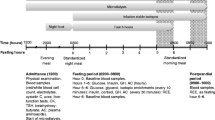Summary
An infant with glycogen storage disease and prolonged malnourishment showed a urinary organic acid profile during an episode of fasting hypoglycaemia with inappropriate hypoketotic dicarboxylic aciduria that was indistinguishable from that reported in long-chainl-3-hydroxyacyl-CoA dehydrogenase deficiency. Although there was a striking elevation of urinary 3-hydroxydecanedioic acid, the ratios between hydroxydicarboxylic acids were consistent with values reported to be indicative of medium-chain acyl-CoA dehydrogenase deficiency. We suspect that the fasting 3-hydroxydicarboxylic aciduria was attributable to secondarily impaired enzyme activities, the consequence of malnutrition, early infancy, and/or glycogen storage disease. Caution is advised in the interpretation of urinary organic acid patterns that indicate a 3-hydroxydicarboxylic aciduria, as well as an inapprorpiate hypoketotic dicarboxylic aciduria, as they may represent non-specific findings.
Similar content being viewed by others
References
Bennett MJ, Ragni MC, Head I et al (1992) Comparison of post-mortem urinary and vitreous humour organic acids.Ann Clin Biochem 29: 541–545.
Dosman J, Crawhall JC, Klassen GA et al (1974) Urinary excretion of C6–C10 dicarboxylic acids in glycogen storage disease types I and III.Clin Chim Acta 51: 93–101.
Greter J, Lindstedt S, Seeman H et al (1980) 3-Hydroxydecanedioic acid and related homologues: urinary metabolites in ketoacidosis.Clin Chem 26: 261–265.
Hagenfeldt L, von Dobeln U, Holme E et al (1990)l-3-Hydroxydicarboxylic aciduria — a fatty acid oxidation defect with severe prognosis.J Pediatr 116: 387–392.
Hale DE, Thorpe C, Braat K et al (1990) Thel-3-hydroxyacyl-CoA dehydrogenase deficiency.Prog Clin Biol Res 321: 503–510.
Kelley RI, Morton DH (1988) 3-Hydroxyoctanoic aciduria: identification of a new organic acid in the urine of a patient with non-ketotic hypoglycemia.Clin Chim Acta 175: 19–26.
Olpin SE, Manning NJ, Carpenter K et al (1992) Differential diagnosis of hydroxydicarboxylic aciduria based upon release of3H2O from [9,10-3H]myristic and [9,10-3H]palmitic acids by intact cultured fibroblasts.J Inher Metab Dis 15: 883–890.
Pollitt PJ (1990) Clinical and biochemical presentations in 20 cases of hydroxydicarboxylic aciduria. In Tanaka K, Coates PM, eds.Fatty Acid Oxidation Clinical, Biochemical, and Molecular Aspects, New York: Alan R Liss, 495–502.
Przyrembel H, Jakobs C, IJlst L et al (1991) Long-chain 3-hydroxyacyl-CoA dehydrogenase deficiency.J Inher Metab Dis 14: 674–680.
Riudor E, Ribes A, Boronat M et al (1986) A new case of C6–C14 dicarboxylic aciduria with favourable evolution.J Inher Metab Dis 9: 297–299.
Rocchiccioli F, Wanders RJA, Aubourg P et al (1990) Deficiency of long-chain 3-hydroxyacyl-CoA dehydrogenase: a cause of lethal myopathy and cardiomyopathy in early childhood.Pediatr Res 28: 657–662.
Tserng K, Jin S, Kerr DS et al (1991) Urinary 3-hydroxydicarboxylic acids in pathophysiology of metabolic disorders with dicarboxylic aciduria.Metabolism 40: 676–682.
Author information
Authors and Affiliations
Rights and permissions
About this article
Cite this article
Bergoffen, J., Kaplan, P., Hale, D.E. et al. Marked elevation of urinary 3-hydroxydecanedioic acid in a malnourished infant with glycogen storage disease, mimicking long-chainl-3-hydroxyacyl-CoA dehydrogenase deficiency. J Inherit Metab Dis 16, 851–856 (1993). https://doi.org/10.1007/BF00714277
Received:
Accepted:
Issue Date:
DOI: https://doi.org/10.1007/BF00714277




